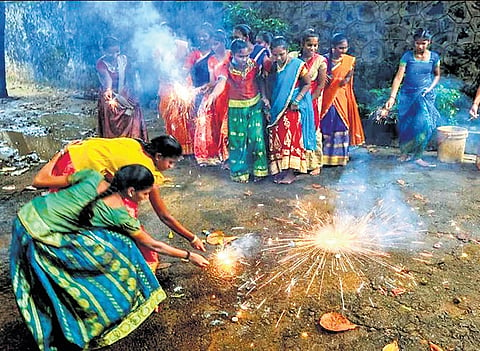

So how should I greet you this week? Am I supposed to say ‘Happy Diwali’ or ‘Happy Deepavali’? That is just the beginning of a meandering tale of rich possibilities in the way we celebrate festivals. In fact, if you are from Bengal or other parts of eastern India, it is best to wish you for Kali Puja that typically falls a day after Deepavali, which northerners conveniently abridge to Diwali.
I have just learnt that Kali Puja was practically unheard of until the 16th century and became widespread two centuries later, thanks to a king. Not everything in Hindustan is ancient, though some would like us to believe that.
Festivals get tricky in the land of Hindus. Sometimes the day varies for the same event. Sometimes the same event has different reasons. Bengalis celebrate Lakshmi Puja in devotion to the goddess of wealth, five days after Vijayadashami that falls during Navratri in which the prominent deity representing the mother goddess is the selfsame Kali, the goddess of valour, who is specially worshipped the day after north Indians have had their own Lakshmi puja.
I have childhood memories of celebrating the south Indian Deepavali in Delhi, where neighbourhood kids would insist Diwali is celebrated at night to mark the return of Lord Rama from exile, while we would get up at dawn to mark the slaying of a demon called Narakasura by Lord Krishna. The demon’s last wish in repentance was for people to celebrate his death as a fall of evil. For the record, Keralites mostly do not mark Deepavali, preferring instead their own Onam, linked to the appearance of Lord Vishnu as Vamana, while Tamil Nadu and the north mark the later incarnations of the same protector.
Things get curiouser when you note Narakasura is said to be from the region near what is now Assam but his slaying is more of a celebratory legend south of the Vindhyas.
And, pray why is Lakshmi Puja celebrated on the same day as Diwali in the north and marked as the beginning of a new financial year by the Hindus there? Dhanteras, a couple of days before the northerners mark Diwali, is believed to be the day goddess Lakshmi and lord Dhanvantri emerged from the ocean during ‘Samudra Manthan’---the churning of the mythological ocean that resulted in boons.
A Facebook right-winger is upset that the Hindu festival is linked to Mughals with some saying that celebratory fireworks began to be attached to Diwali during that period. But it is a historical fact that Diwali was marked during the Mughal period from Dussehra up until the main day as Jashn-e-Chiragh (festival of lights). The fact that fireworks did not originate in the subcontinent is proof enough that Diwali has been a big tent event marking the celebration of both diversity and dynamic change in India.
The rise of Hindu religious puritanism has stirred controversy in recent times, but ordinary people do not seem particularly bothered. An X trend this week asked us to boycott a certain Hindi newspaper because it carried a front-page jacket that asked people to avoid fireworks. This thing, dubbed ‘anti-Hindu’, is more out of a recent concern against noise pollution and foul air.
It was disturbing to see a report that a housing society official in Uttar Pradesh’s Ghaziabad threw out a Muslim from the condominium’s lift upon learning he was an Urdu teacher and asked to say ‘Jai Shri Ram’. But it is heartening to read, in Rajasthan’s Bikaner, there is a unique 12-year-old tradition of celebrating Diwali by reading an Urdu version of the Ramayana.
There is some unsettling news for those who think Hindu celebrations are mandatorily vegetarian. Social media chatter erupted recently when northerners advocating vegetarian diets during the Navratri festival were gently reminded that in Bengal, the same Durga Puja period features all sorts of meat and chicken. In Tamil Nadu, goats are bought by the thousands to be slaughtered for Deepavali feasts, something barely known in other parts of India.
You could say what unites in India is not a particular festival or religious colour but a general idea of celebrating events with joy. You may call this a penchant for ‘festivalism’ that towers over other isms, with a generous dash of diversity thrown in.
There is often a government, king, business house or common sense behind some of the twists and turns of India’s festival craze. New-fangled advertisements and media reports in electronic media have made India a smaller place, causing cross-cultural migration of styles and celebrations.
In Tamil Nadu’s Kollukudipatti, villagers are keeping up a decade-old tradition of celebrating Diwali with no firecrackers in order not to disturb migratory birds that visit the nearby Vettangudi bird sanctuary.
Days before Diwali, I saw an Instagram influencer famous for her travel tales partner with a bank to suggest youngsters should use a certain credit card to celebrate their Diwali out of town (or country) by making use of special discounts.
Who knows, if Gen Z fancies this, the future may see north Indians locking up their homes when Goddess Lakshmi is supposed to visit and swap it for an exotic holiday. That would be quite a reverse swing.
It is not for nothing that “We are like this only” is a modern Indian English proverb. On that note, have a good season!
(Views are personal)
(On X @madversity)
Madhavan Narayanan | Senior journalist